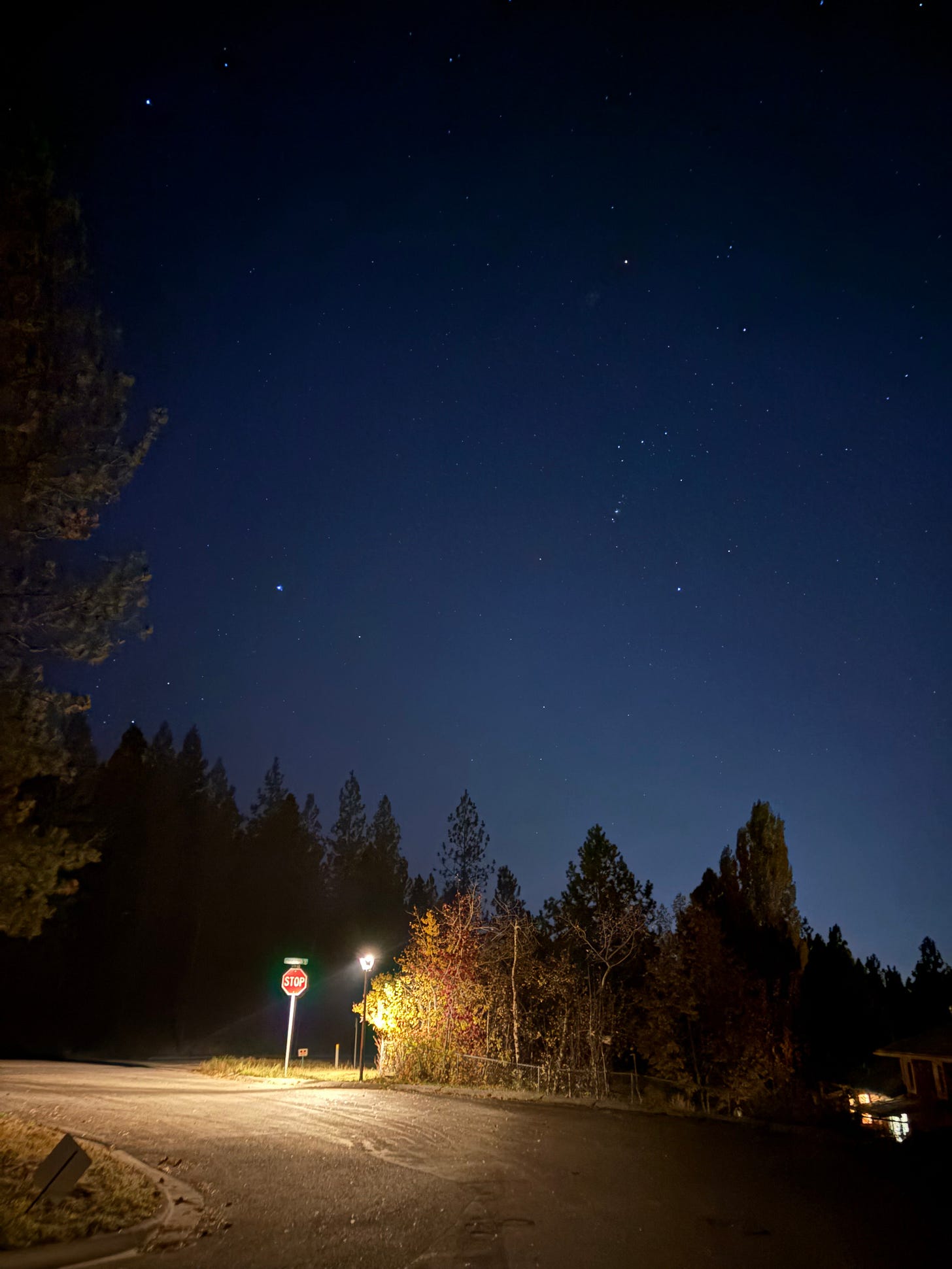Post-Return Notes
On the art of coming back—ready for a "Writing with Mules" workshop?
Coming back is almost as important as leaving—or arriving. Not because you want to clutch at an exceptional, fleeting moment, but because returning is your chance to let the experience linger—maybe even change shape as it settles into the ordinary.
“Maybe forever,” I thought on my drive back from Flathead Lake, the peaks of the Mission Mountains powdered in fresh snow, the line where snow turned to rain like a seam between two worlds. The larches brightened the hills by Arlee in their deep yellow. It rained, then the sun came out. I was so thankful to live here.
Frankly, the first day home, I was overwhelmed—so much love. The kids had drawn Welcome Home in chalk across the driveway. The dog went wild. Everyone helped me unload the car. I felt lucky to return to my family after spending four weeks exploring and creating art. Then the bubble burst.
Judson left for work that afternoon. Like with any of his shifts, this one had its good and bad. Good, because I got to see him. Bad, because he was gone for the rest of the day. Within three hours of my arrival—after four weeks almost entirely on my own schedule—I was juggling a dance drop-off and pickup that overlapped with a workshop I wanted to attend, and trying to do right by my son, who wanted to be with me but also to play with a friend, all of whom were already busy or out of town.
Boxes of books and bags of dirty laundry piled up in the entryway. No time to unpack. Chaos. I took a deep breath. Wow. That was my everyday life; no wonder I was always exhausted. And I hadn’t even called my mom or opened my email yet.
That evening, after the workshop, after picking up my daughter—whom I had dropped off two hours early—and after someone else fed the horses for me, I came home to a warm dinner and cookies. Annabelle, one of my fellow residents, and her mom were making an overnight stop on their four-day road trip back to Chicago. They had picked up food, and Noam had proudly shown them around the house: the Legos he built that afternoon, the soccer medals from the past season. “Two,” he said, beaming.
I started one load of laundry, ignored the rest, enjoyed bedtime hugs from my children, and had a tea on the couch. Busy day already, I wrote in my journal that night, and texted Judson: Be careful when you come in, lots of boxes to trip over.
The next morning, I woke early. Had a tea with my daughter before walking her to the school bus, the stars were so bright I wanted to take a second look at the clock. Soon, the boys left for school and a coffee. The house grew quiet. The dog and I slipped outside. The air had that clean, metallic chill that comes before sunrise. Frost traced the leaves as the last stars slowly disappeared into the blue of the sky. We walked uphill, my breath a thin cloud in front of me. Each step felt like a small act of return.
During my time at Flathead Lake, I learned how to arrive, to listen, to trust my words. But home is where I learn how to keep what I found, cherish it, and let life fuel it even more.
The art of coming back is to let the quiet be audible while allowing the noise to unfold around it.
On top of the hill, the light began to spill over, soft and new. For a moment, I could still feel the cold waves of the lake inside me—its echo folding into the sound of a waking town, into the belonging that waits at the end of the road.
Bis bald,
Eva
News
I’m considering offering “Writing with Mules” an experiential writing workshop—combining two things I love: writing and mule packing. We’ll create your own archaeology of story, exploring how to give voice to artifacts and spark your writing, while I teach some basic mule-packing skills. Let’s try it out for three hours, a small test run with a few curious people in January, probably at Smoke’s barn in the Rattlesnake in Missoula.
Sounds like fun?



Grazie mille, sorellina! Mi fa molto piacere.
It's great to read you remarking about the process of coming home. It seems so ordinary, but has so many possibilities for newness as well as stepping back into "normal."